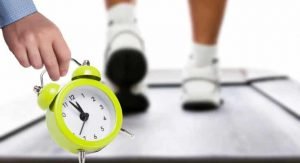In my experience, the most common reasons for not exercising are the lack of results and not enough time to workout. Taking that into account I would have to start by saying that the best time to exercise is always going to be the time you can most easily fit it into your lifestyle. Exercising at any time of the day is better than not exercising at all!
It is said that your body does have the internal clock, a natural sleep and wake rhythm also known as the Circadian Rhythm. Your body temperature, metabolism, blood pressure and alertness are just a few of the physiological functions regulated by the circadian rhythm. The rhythm usually conforms to your 24 hour day, but it is possible to teach your body to do something outside of the normal time slot. For example, research has proven that it is easier to teach your body to exercise in the morning than it would be at any other time of the day. This has resulted in people who start an exercise routine in the morning sticking to their routines for longer periods of time. While it may be easier to make exercising habitually by moving your slot to the morning this is not the only thing you need to consider.
What is the best time for cardiovascular training?
Exercising, in general, is better when your body temperature is at its highest. For most people, this is usually between 16:00 and 17:00. In contrast, our body temperature is at its lowest just before waking in the morning. As you may have noticed this is the first contradiction to habitual positive mentioned previously. Other reasons to move our training slot to the afternoon/evening are:
Greater Aerobic Capacity
Aerobic capacity, also called VO2 max is the maximum amount of oxygen that can be utilized by the body during physical exertion. Research has shown that an average person’s aerobic capacity is greater in the afternoon/evening.
Less Injury Prone
Injuries can happen at any time when exercising. We can minimize the risk by making sure our bodies are warmed up thoroughly, alert and are at their peak strength. All three of these things occur naturally in our bodies in the afternoon/evening.
As I mentioned above, you will be better off exercising at any time of the day as opposed to not at all however if possible you would benefit more from cardiovascular training by moving your exercise slot to the afternoon/evening time.
What is the best time for weight training?
I came across a study carried out by the University of Southern Mississippi. They took 16 males, all with prior weightlifting experience and set them a 10-week exercise routine involving 45 minutes of weight training followed by 45 minutes of cardiovascular training. They would all be following a 2-day split resulting in 4 sessions weekly. Half of the group were given a morning slot (before 10:00) while the other half were given an evening slot (after 18:00).
At the conclusion of the study, the group who lifted weights in the morning had gained almost no muscle mass and had lost no body fat while the group who lifted in the evening, on average gained 3% muscle mass and dropped, on average 4% bodyfat. So why did this happen?
Research has shown that you are stronger in the afternoon/evening and as a result of the intensity you can train at will increase. Higher intensity exercise means better results.
While it is a well-known fact that free testosterone is higher in the morning, it has been found that your body’s release of additional testosterone in response to exercise is much greater in the afternoon/evening. Exercising then greatly outweighs the free testosterone circulating your body in the morning.
There is another hormone in play here in my opinion. Cortisol has many functions in the body, one of them being its ability to cause muscle tissue breakdown. Cortisol levels are higher in the morning and as a result, any gains made from weight training are likely to be lost. Add to this that your body’s cortisol response is also higher in the morning (your body releases more of the hormone in addition to normal levels) and you can see why the afternoon/evening slot, again is the better choice.
The group exercising in the evening had combined their higher testosterone response and lower cortisol response for even better results.
Your metabolism is at its highest in the morning, and I suspect that the high percentage of body fat loss for the group training in the evening was a result of a boost to an otherwise low metabolism. Those exercising in the morning will have little if any increase whereas those exercising in the evening would normally have a low metabolism but get a significant boost because of the exercise.
One final possible cause of the results could be that exercising in the evening can help you get a good night’s sleep. What has that got to do with body fat loss and muscle tissue gain I hear you ask? The majority of your recovery and repair takes place at night, growth hormone is released and muscle tissue repaired and replaced. Better sleep will inevitably mean better results.
When is the best time to exercise?
I think it is fair to conclude that both cardiovascular exercise and weight training are best done in the afternoon/evening. As I have sometimes said already it is better to train at any time of the day than to not train at all! Consistency is the key to results so pick a time where you can comfortably fit the exercise into your 24 hour day and stick to it. Happy exercising!
